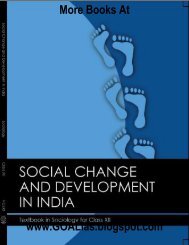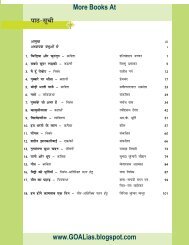t.com www.GOALias.blogspot.com www.GOALias.blogspot.com
t.com www.GOALias.blogspot.com www.GOALias.blogspot.com
t.com www.GOALias.blogspot.com www.GOALias.blogspot.com
- No tags were found...
Create successful ePaper yourself
Turn your PDF publications into a flip-book with our unique Google optimized e-Paper software.
<strong>www</strong>.<strong>GOALias</strong>.<strong>blogspot</strong>.<strong>com</strong>94 Politics in India since Independence“History … isreplete with instances ofthe tragedy that overtakesdemocracy when a leaderwho has risen to power onthe crest of a popular waveor with the support of ademocratic organisationbe<strong>com</strong>es a victim ofpolitical narcissismand is egged on by acoterie of unscrupuloussycophants…...“S NijalingappaLetter to Indira Gandhiexpelling her from theparty, 11 November1969.On both the above issues serious differences emerged between himand the Prime Minister resulting in Desai leaving the government.Congress had seen differences of this kind in the past. Butthis time both the parties wanted a showdown which took placeduring the Presidential elections. The then Congress PresidentS. Nijalingappa issued a ‘whip’ asking all the Congress MPs and MLAsto vote in favour of Sanjeeva Reddy, the official candidate of the party.Supporters of Indira Gandhi requisitioned a special meeting of theAICC (that is why this faction came to be known as ‘requisitionists’)but this was refused. After silently supporting V.V. Giri, the PrimeMinister openly called for a ‘conscience vote’ which meant that theMPs and MLAs from the Congress should be free to vote the way theywant. The election ultimately resulted in the victory of V.V. Giri, theindependent candidate, and the defeat of Sanjeeva Reddy, the officialCongress candidate.The defeat of the official Congress candidate formalised the splitin the party. The Congress President expelled the Prime Ministerfrom the party; she claimed that her group was the real Congress. ByNovember 1969, the Congress group led by the ‘syndicate’ came to bereferred to as the Congress (Organisation) and the group led by IndiraGandhi came to be called the Congress (Requisitionists). These twoparties were also described as Old Congress and New Congress. IndiraGandhi projected the split as an ideological divide between socialistsand conservatives, between the pro-poor and the pro-rich.Abolition of Privy PurseIn Chapter One you have read about the integration of the Princely States. This integration waspreceded by an assurance that after the dissolution of princely rule, the then rulers’ familieswould be allowed to retain certain private property, and given a grant in heredity or governmentallowance, measured on the basis of the extent, revenue and potential of the merging state.This grant was called the privy purse. At the time of accession, there was little criticism of theseprivileges since integration and consolidation was the primary aim.Yet, hereditary privileges were not consonant with the principles of equality and social and economicjustice laid down in the Constitution of India. Nehru had expressed his dissatisfaction over thematter time and again. Following the 1967 elections, Indira Gandhi supported the demand that thegovernment should abolish privy purses. Morarji Desai, however, called the move morally wrongand amounting to a ‘breach of faith with the princes’.The government tried to bring a Constitutional amendment in 1970, but it was not passed in RajyaSabha. It then issued an ordinance which was struck down by the Supreme Court. Indira Gandhimade this into a major election issue in 1971 and got a lot of public support. Following its massivevictory in the 1971 election, the Constitution was amended to remove legal obstacles for abolitionof ‘privy purse’.
















